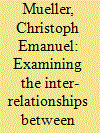|
|
|
Sort Order |
|
|
|
Items / Page
|
|
|
|
|
|
|
| Srl | Item |
| 1 |
ID:
168323


|
|
|
|
|
| Summary/Abstract |
Governments and energy operators are frequently confronted with opposition to the construction of new high-voltage transmission lines. In this context, a recent experiment by Mueller et al. (2017) tested the so-called proximity hypothesis and found that spatial proximity to proposed transmission line corridor route alternatives significantly affected residents' likelihood of having negative risk expectations, showing low levels of support, and engaging in protest against the planned facility. Moreover, their findings suggest that the relationship between spatial proximity and the dependent variables is appropriately modeled by a distance decay function, showing that effects attenuate with increasing distance from the infrastructure site. Unfortunately, because of the fact that the study is the only one that has tested the proximity hypothesis in the context of planning new transmission lines so far, the existing evidence cannot be considered as a solid knowledge base. Therefore, to strengthen the reliability of the existing evidence, the natural experiment of Mueller et al. (2017) has to be replicated, which is the purpose of the present study. The findings of the replication clearly support the results provided by Mueller and colleagues and provide further empirical evidence that strengthens the proximity hypothesis in the context of power grid expansion.
|
|
|
|
|
|
|
|
|
|
|
|
|
|
|
|
| 2 |
ID:
175030


|
|
|
|
|
| Summary/Abstract |
This study contributes to the literature by examining the effects of four particular determinants of public attitudes towards power grid expansion projects, namely residents' perceived procedural fairness, their trust in actors involved in the planning procedure, their risk expectations, and their perceived benefits. By accessing data collected from residents living along and in the wider area of a controversially discussed grid expansion project in Germany, a theoretically derived path model was tested empirically by means of structural equation modeling. The findings revealed that perceived procedural fairness directly affected residents’ trust in actors and indirectly influenced their risk expectations, their perceived benefits, and attitudes. Trust exerted a significant influence on risk expectations, perceived benefits, and attitudes, whereas risk expectations and perceived benefits significantly affected attitudes. Overall, the findings provide novel insights into specific mechanisms that shape public attitudes towards the construction of new HVTLs and suggest that it is crucial for the competent planning authorities and transmission system operators to provide fair information and participation measures and establish a trustworthy relationship to local residents affected by the infrastructure project.
|
|
|
|
|
|
|
|
|
|
|
|
|
|
|
|
| 3 |
ID:
162953


|
|
|
|
|
| Summary/Abstract |
Governments and energy operators are often confronted with local residents’ protest against the construction of new high-voltage overhead transmission lines, negative risk expectations, and a lack of public support. A frequently discussed strategy for dealing with these issues is to build underground cables instead of overhead lines. So far, however, there is not much empirical evidence of whether substituting overhead lines by underground cables actually reduces protest or affects public risk expectations and attitudes. This study contributes to filling this gap by comparing residents’ risk expectations, attitudes, and protest behavior observed at two grid expansion sites in Germany by means of a quasi-experiment. At the time when the data were collected, both grid expansion projects–an overhead line project in Lower Saxony and an underground cable project in Hesse–were at the same stage of the legally defined planning and approval procedure. After controlling for various potential confounders, we obtained results revealing that there are no differences in the risk expectations, attitudes, and protest behavior of residents interviewed at the two project sites, or only marginal ones. Hence, our findings do not support the assumption that building underground cables necessarily improves the situation with regard to risk expectations, attitudes, and protest behavior.
|
|
|
|
|
|
|
|
|
|
|
|
|
|
|
|
| 4 |
ID:
174991


|
|
|
|
|
| Summary/Abstract |
To increase acceptance and reduce opposition towards power grid expansion, various opportunities for citizen participation have been implemented within grid-expansion-related planning procedures. Previous studies have found that residents' participation can lead to an increase in acceptance and a reduction in conflict, particularly if the participation processes are perceived as fair and just. A question that has not been answered sufficiently so far, however, is why residents participate in information and participation measures offered throughout the planning process of transmission line projects. This question is addressed in the present study. On the basis of the ‘Civic Voluntarism Model’, this study derives research propositions on potential determinants of participation and empirically tests them by drawing on data collected from residents in two German regions affected by grid expansion. The results show that specific resources available to residents, psychological motivation factors, and recruiting social networks can significantly influence the probability of participation. Since the studies in both regions arrived at very similar results, the findings possess a high degree of external validity. Overall, the study presents novel insights into the mechanisms of citizen participation in power grid planning and provides policymakers, regulators, and transmission system operators with relevant practical knowledge.
|
|
|
|
|
|
|
|
|
|
|
|
|
|
|
|
|
|
|
|
|